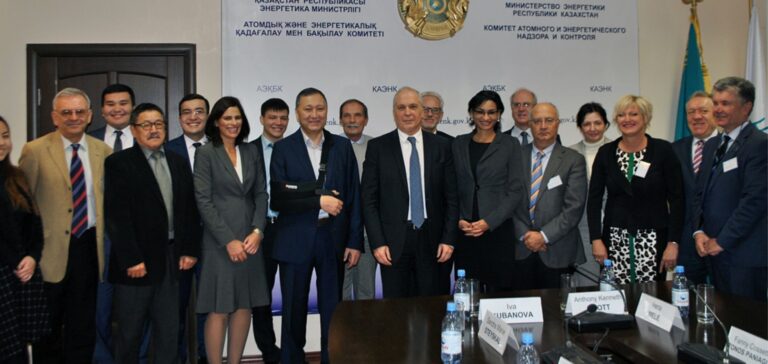According to IAEA experts, Kazakhstan has made progress in implementing the recommendations of an IAEA nuclear infrastructure review mission in 2016. The four-day Integrated Nuclear Infrastructure Review (INIR) mission was conducted at the request of the Kazakh government. INIR missions allow representatives of IAEA member states to have in-depth discussions with international experts on the conditions and best international practices for developing a nuclear program.
Kazakhstan wants to reintroduce nuclear power into its energy mix
A Russian-designed sodium-cooled fast reactor, the BN-350, operated near Aktau in Kazakhstan for 26 years until 1999, producing electricity and desalinating water. Currently, Kazakhstan operates research reactors as well as several other nuclear facilities related to the front end of the nuclear fuel cycle, including uranium mining. The country holds about 14% of the world’s uranium resources and is the largest producer.
Kazakhstan’s Ministry of Energy has proposed the potential reintroduction of nuclear power to reduce the country’s dependence on fossil fuels, diversify its energy mix and reduce CO2 emissions. The Nuclear Power Plant of Kazakhstan (KNPP), which has been designated as the owner/operator of the future plant, began preparing a feasibility study in 2018 to justify the need for nuclear power, select the location for the plant’s construction, and review the projected power output of the plant.
INIR mission to Kazakhstan is a success
The INIR mission follow-up team visited Astana from March 28-31 to assess the level of implementation of the recommendations and suggestions from the INIR mission conducted in 2016. The INIR mission examined the status of nuclear infrastructure development using the criteria of Phase 1 of the IAEA Milestone Approach, a comprehensive method to assist countries considering or planning their first nuclear power plant that divides the activities required to establish the infrastructure for a nuclear program into three progressive phases of development: consider, prepare, and build. The end of Phase 1 marks a country’s readiness to make an informed commitment to a nuclear program.
The team noted that Kazakhstan has fully addressed the recommendations in the areas of coordination of a nuclear program, financing of the NPP, emergency planning, and radioactive waste management. “Kazakhstan has made considerable efforts to address the recommendations and suggestions of the INIR team in 2016, including preparatory work to inform the government’s decision on the possible introduction of a nuclear power program,” said Mehmet Ceyhan, head of the mission.
The IAEA mission to Kazakhstan: the beginning of a process
The team stated that additional work was needed to complete the comprehensive report that supports the decision-making process for the nuclear power program to assess the funding needs for the nuclear power infrastructure, plan for the future development of the regulatory body and future owner/operator KNPP, and develop a policy for the industrial involvement of the nuclear power program in the country. “By requesting the INIR mission, Kazakhstan has demonstrated its interest in obtaining an objective and professional assessment of the readiness of its nuclear infrastructure to provide nuclear energy to the country,” said Zhandos Nurmaganbetov, Kazakhstan’s deputy minister of energy.






















